PPE Production Stories from Members of IFAI
ATA applauds all of its members who have adapted and pivoted during the COVID-19 pandemic. In August, we asked ATA members to share their experiences with the abrupt and crucial adjustment to PPE production. The below members shared their stories on how they rose to the occasion to meet demands. The industry continues to evolve as the COVID-19 pandemic continues. ATA members make a difference, and we recognize each company who has stepped up during these challenging times.
JTE Machines
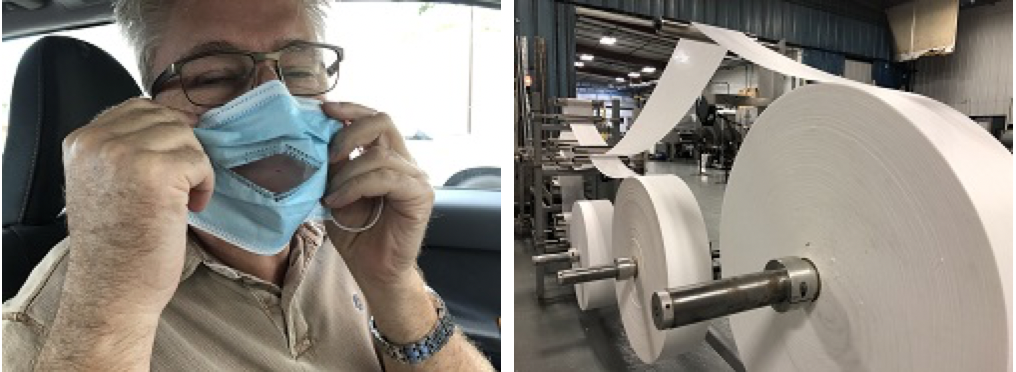
Right – surgical mask material used in production
With the increased demand for PPE made in the U.S., JTE utilized its experience with ultrasonic, RF and automation and pivoted to providing Automated Manufacturing Lines for the production of surgical masks, N95 masks, surgical gowns and body bags
As JTE quickly ramped up production and support of PPE automation equipment, they soon had to become experts on the materials that are being used for the variety of surgical masks and gowns that are needed. Ultrasonic technology is highly dependent on the thickness, structure and strength of the material being used; therefore, the dependency of material to machine performance becomes essential to consider for consistent, high-quality output. For an RF weld, the way the coating is adhered to the fabric and how thick the coating is can affect the overall quality of the product. The RF weld is very consistent with enough coating; if the coating is not adequately adhered to the material, the RF weld strength becomes less significant if the coating doesn’t stick to the base fabric sufficiently. JTE has a lab where they are testing for these qualities on a daily basis to help manufacturers come up with the right mix of material and equipment solutions.
Every week, JTE is asked to help design or create a new product solution, many of which are related to the PPE industry. As face coverings evolve, so does the need for solutions for people who are deaf or need to read lips to communicate. Traditional face coverings do not work for hearing impaired people; these people are left with a choice between being safe or being able to communicate with others. One such request was to create a safe see-through face mask for users who need to lip read. Of course, all parties involved would need to wear these type of masks. Plans are going forward for a rough prototype that JTE mocked up to show the potential client.
RBH Designs, LLC
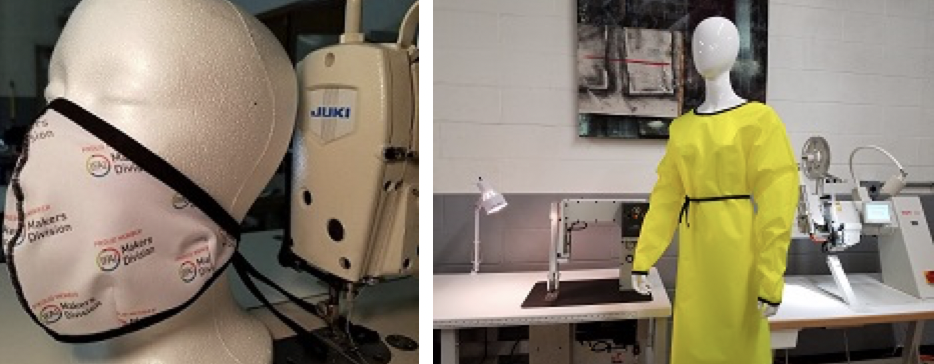
Right – RBH Designs prototype PPE gown constructed for the local Tolland CT Fire department
Since 1998, RBH Designs has custom-crafted technical outdoor performance apparel and accessories, specializing in vapor barrier technology that features their proprietary VaprThrm fabric technology. The typical application has been used primarily in colder conditions to prevent degradation of insulation from sweat, although they have found some interesting industrial applications, such as insulated covers for pharmaceutical cryovats. As it turns out there is much synergy between the outdoor market and PPE. The raw materials, suppliers of barrier films, and manufacturing equipment share the same footprint; as such, RBH saw the time to move into the space as “the protection company.” Subsequently RBH invested in new space and ultrasonic welding as well as hot air seam taping which had long been on the wish list. As they survey the current availability and pricing landscape, it is still dominated by imports. They are looking at opportunities for Berry compliant products that can offer an economically viable price point before scaling up. In the interim, RBH Designs is focused on utilizing the new facility and state-of-the-art equipment for R&D and education purposes during this challenging time.
Carolina Covertech
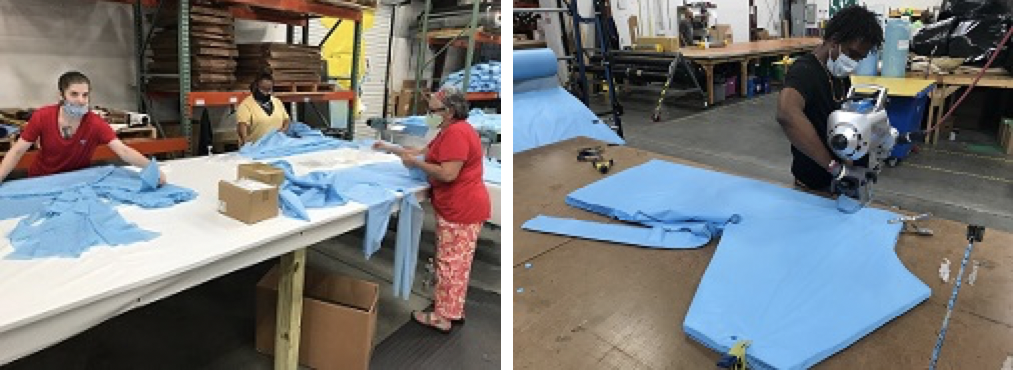
Eastman Machine Company
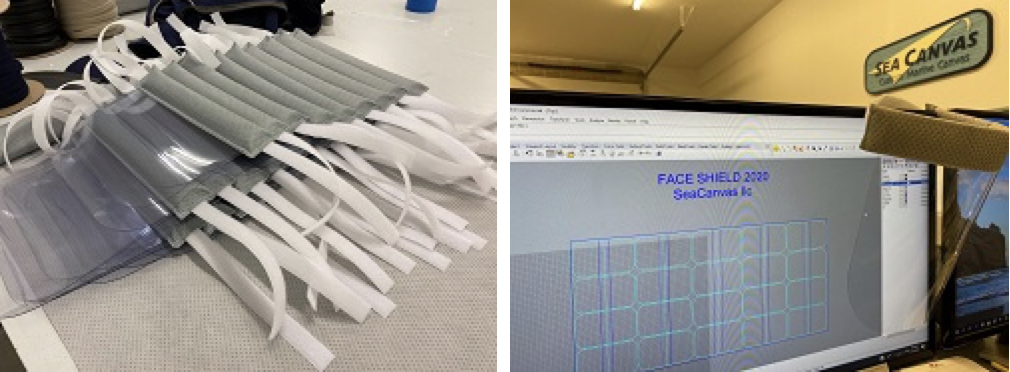
Right – Eastman’s cutting software in the SeaCanvas shop
Hundreds of Eastman customers around the globe shifted away from usual production to manufacture PPE. The Eastman factory has remained open since the onset of the coronavirus outbreak to ensure shipment of essential parts, consumables and even new machines. Their software applications team has been providing around-the-clock support, creating new PPE cutting patterns, recommending blade and machine parameters and sourcing sought-after, in-demand materials. As a fifth-generation, family operated company, Eastman believes in building strong customer relationships. Eastman has always worked in tandem with industry engineers to design, build and customize cutting solutions, allowing manufacturers to overcome various challenges. The pandemic afforded them the opportunity to listen even closer, enhancing their ability to respond to customers’ needs in a timely fashion. Millions of people across the globe now have access to necessary protection, because of Eastman customers. Eastman employees are extremely proud to play a minor role in these efforts.
Gehring-Tricot, Corporation
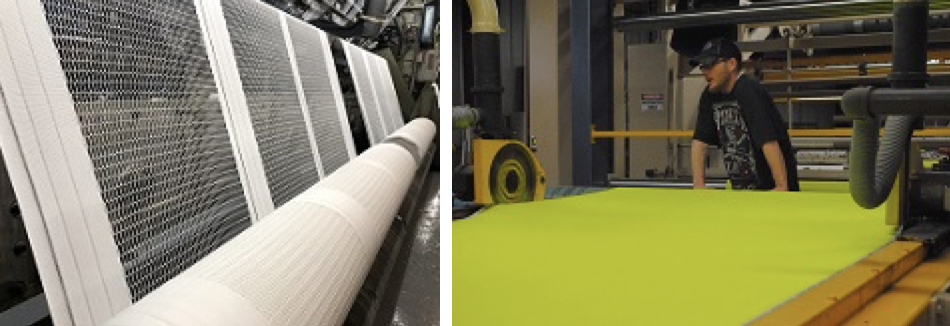
Right – Fabric being framed that is used as safety clothing for various frontline workers
Gehring Tricot Corporation is a textile manufacturer that was founded in 1946. In its third generation of ownership, this family-owned and operated business has remained committed to supplying various industries with high quality, American-made material with its four branches located in New York and Massachusetts.
During the pandemic, GTC was deemed an essential business, so they were able to continue business, running at 70% capacity while still paying 100% of employees. Some employees even took on additional tasks—like the creation of a COVID Task Force. The responsibility meant some had to take on the additional role of assuring everyone’s health and safety by creating and enforcing new safety policies throughout all locations and following state and federal mandates and guidelines.
Skip Gehring, President and CEO of GTC, has prioritized supplying various markets including, but not limited to military, medical, first responders, and safety apparel. Their factories are making and supplying fabrics for medical masks, nonmedical masks, hospital gowns, hospital curtains, medical bandages and other medical supplies. They are supplying many products related to the military, national defense in ballistics, firefighting apparel, tactical vests, military tent screening, and other items that go for the first responders’ safety materials. Since they were already supplying these essential markets, there was no need to shift or change production process, only focus on fine-tuning products.
Gehring Tricot Corp. has further contributed in the support of the preventing the spread of COVID-19 by donating thousands of masks to local townspeople, fire departments, nursing homes, first responders and local schools. They also proudly provide American-made products, further reinforcing their commitment to support COVID-19 prevention efforts.
Each employee has stepped up to help. Sacrifices have been made without complaints, and the employees continue to work with pride. Without them, none of this is possible. The company efforts are also a testament to the textile industry as a whole; everyone has come together and is working so well together. It proves that the American spirit to come together is alive and well.
From staff safety to new products lines – how has your company responded to this crisis? If you would like to share your company’s story with the ATA membership, please click here to submit.










